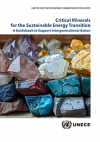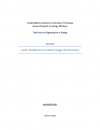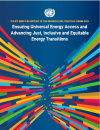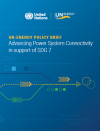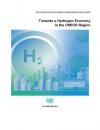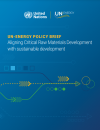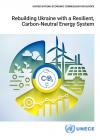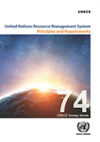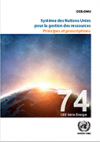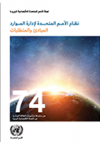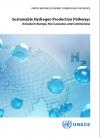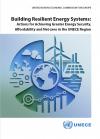Publications
Displaying Results 1 - 20 of 149
Guidebook on Critical Minerals for Sustainable Energy Transition to Support Intergenerational Action
- English
Critical minerals are essential for the energy transition as are intergenerational equity in resource management and the engagement of youth. The EGRM Resource Management Young Member Group has developed the publication "Critical Minerals for the Sustainable Energy Transition: A Guidebook to Support Intergenerational Action”. This Guidebook serves as a crucial tool to aid policymakers, industry
- English
Digitalization is gaining more and more attention as a way to support and complement the energy transition process. Digitalization entails the use of digital technologies for existing processes, as it helps address existing challenges in new ways.
While using an integrated energy system with intelligent connected devices has many advantages, it also causes challenges. One of these challenges is
- English
This case study addresses the challenge of distributed energy resources integration to support grid resilience, identifying key infrastructure requirements, assessing policy developments and deriving recommendations. The underlying premise of this case study asserts that whilst the energy sector is making advances towards decarbonization, decentralization and digitalization, the increasing share
- English
The sixth compilation of the SDG 7 Policy Briefs, titled "Ensuring Universal Energy Access and Advancing Just, Inclusive and Equitable Energy Transitions," prepared by the SDG 7 Technical Advisory Group (SDG7 TAG), in support of the review of the SDGs at the United Nations High-Level Political Forum 2023.
- English
This UN-Energy Policy Brief was prepared in support of the SDG7 review at the High-level Political Forum 2023 in line with the UN-Energy Plan of Action Towards 2025. The Plan outlines UN-Energy’s contributions towards the implementation of the Global Action Plan for Accelerated SDG 7 Action presented by the UN Secretary-General as an outcome of the UN High-level Dialogue on Energy in 2021. The
- English
Hydrogen is an energy carrier that can decarbonize economies and promote sustainable economic growth and system resilience. Although many low-emission hydrogen projects have been announced over the past two years, a mere 4% of them have reached a final investment decision. This indicates that achieving the scale and pace of hydrogen deployment requires more decisive actions from policymakers and
- English
Transitioning towards a clean energy future is a core element of global efforts to achieve the climate goals of the Paris Agreement. The technologies underpinning that transition to low-carbon energy systems – such as wind, solar photovoltaic (PV), electric motors and batteries – are more minerals-intensive than fossil fuel-based technologies, however. As a result, the energy transition implies a
- English
In view of their high untapped potential, bioenergy, hydro, solar and wind generation could constitute the building blocks of Ukraine’s future energy system, contributing up to nearly 80% of total energy generation by 2050. Provided key strategies and investments are put in place, and complemented by nuclear, renewables could propel Ukraine towards a carbon-neutral future. These are the main
- English
ADVANCED VERSION
The transition of the global energy system is leading society towards an innovative future, offering an opportunity to transcend the current global economy in favour of a more sustainable one. Equal gender participation in this endeavour can help society leap to a future of technological advancement in the energy sector. This report analyzes key issues,
- 汉语
可持续发展的多方面要求主要取决于负责任的最优自然资源生产和利用。为 满足均衡开发自然资源的要求,需要自然资源生产和利用的新范式,包括向 循环经济迈进。联合国资源管理系统是支持落实《2030年可持续发展议程》 的综合性可持续资源管理框架。 联合国资源管理系统以全球范围内广为接受的《联合国资源框架分类》为基 础,包含了透过社会-环境-经济可行性、技术可行性和资源估计可信度三 重视角评估资源的一套独特方法论。联合国资源管理系统是公共、公私和民 间社会伙伴关系框架下的可持续综合性资源管理的一种自愿性全球标准。
- Pусский
Многогранные требования устойчивого развития в основном зависят от оптимального и ответственного использования природных ресурсов. Чтобы реализовать потребность в сбалансированном освоении природных ресурсов, требуется новая парадигма добычи и использования природных ресурсов, включая переход к экономике замкнутого цикла. Система управления ресурсами Организации Объединенных Наций (СУРООН)
- Français
Pour satisfaire aux exigences multiformes du développement durable, il faut avant tout utiliser les ressources naturelles de manière optimale et responsable. Il est nécessaire de mettre en place un nouveau paradigme de production et d’utilisation des ressources naturelles, et notamment de progresser vers un modèle d’économie circulaire, si nous voulons parvenir à un développement équilibré des
- Español
Los requisitos pluridimensionales del desarrollo sostenible dependen principalmente del uso óptimo y responsable de los recursos naturales. Se requiere un nuevo paradigma de producción y utilización de los recursos naturales, lo que incluye avanzar hacia una economía circular, para asumir la necesidad de un desarrollo equilibrado de dichos recursos. El Sistema de las Naciones Unidas para la
- English
The multifaceted requirements of sustainable development depend primarily on the optimal and responsible use of natural resources. A new paradigm of natural resource production and use, including progressing towards a circular economy, is required to realise the need for the balanced development of natural resources. The United Nations Resource Management System (UNRMS) is a comprehensive,
- العربية
تعتمد المتطلبات المتعددة الأوجه للتنمية المستدامة في المقام الأول على الاستخدام
الأمثل والمسؤول للموارد الطبيعية. إذ تدعو الحاجة إلى نموذج جديد لإنتاج الموارد الطبيعية
واستخدامها، بما في ذلك الانتقال إلى اقتصاد دائري، بهدف تحقيق الحاجة إلى التنمية المتوازنة
للموارد الطبيعية. ونظام الأمم المتحدة لإدارة الموارد هو إطار شامل ومستدام لإدارة الموارد
الطبيعية يدعم تحقيق خطة التنمية المستدامة لعام 2030
- English
Low-carbon hydrogen deployment is crucial for achieving the Paris Agreement goals and for deep decarbonization in hard-to-abate sectors (in particular, in heavy long-distance transport, in the steel industry, fertilizer production, etc.). By the end of 2022, more than 70 countries around the world are already involved in drafting of national hydrogen strategies or have already adopted them,
- Pусский
- Français
Dans la région de la CEE, les États membres sont confrontés à des défis sans précédent en raison de la pandémie de Covid-19, les crises géopolitiques, les perturbations dans la chaîne d’approvisionnement et les répercussions des changements climatiques. Ces défis ont mis à jour la vulnérabilité des systèmes énergétiques dans la région de la CEE et mis l’accent sur le besoin urgent de mettre en
- English
Across the UNECE region, member States are facing unprecedented challenges due to the COVID-19 pandemic, geopolitical crises in the region, supply chain disruptions, and climate change impacts. These challenges have exposed the vulnerability of the UNECE energy systems and highlighted the urgent need to build more resilient energy systems. The UNECE Expert Community prepared a paper to help
- Pусский
ADVANCED VERSION
Low-carbon hydrogen deployment is crucial for achieving the Paris Agreement goals and for deep decarbonization in hard-to-abate sectors (in particular, in heavy long-distance transport, in the steel industry, fertilizer production, etc.). By the end of 2022, more than 70 countries around the world are already involved in drafting of national hydrogen strategies
